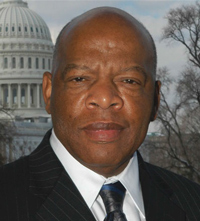Controversial Netanyahu speech to Congress moves forward
By Askia Muhammad -Senior Editor- | Last updated: Feb 26, 2015 - 10:10:05 PMWhat's your opinion on this article?
Related news:
Netanyahu and Republicans Beating the Drums of War (FCN, 02-10-2015)

Israeli Prime Minister Benjamin Netanyahu walks with House Speaker John Boehner of Ohio, to make a statement on Capitol Hill in Washington, May 24, 2011.
|
The dispute centers around a secretive invitation from Mr. Boehner to the Israeli leader to address a joint session of Congress in which Mr. Netanyahu is expected to criticize the U.S. strategy for negotiating a nuclear arms agreement among this country and five other world powers (the P5+1, the five permanent members of the U.N. Security Council, the U.S., United Kingdom, France, China, and Russia, plus Germany) with Iran, about the future of Iran’s nuclear energy program.
Rather than observing customary protocol—that is arranging the visit of a head of state with top officials in the country to be visited—Mr. Boehner informed the White House of the Netanyahu invitation just 10 minutes before it was announced to the public, on Jan. 21, the morning after the president’s State of the Union address.
Speaker Boehner also asked Ron Dermer, Israel’s ambassador to the U.S., not to tell the White House or the State Department about the joint meeting with Mr. Netanyahu during the negotiations. “Because I wanted to make sure that there was no interference,” Mr. Boehner told Fox News host Chris Wallace when asked about the protocol breach. “There’s no secret here in Washington about the animosity that this White House has for Prime Minister Netanyahu. I frankly didn’t want that getting in the way, quashing what I thought was a real opportunity.”
The White House expressed disappointment at the snub, and cited the “proximity to the Israeli election,” when it announced that Mr. Obama would not meet with the Israeli leader during his visit.
Vice President Biden announced that he would not attend the joint congressional session—where as the official President of the Senate he would normally sit conspicuously next to Speaker Boehner, behind the speaker’s rostrum during the address—because he would be traveling. Secretary of State John Kerry also announced he would not attend.

John Lewis (D-Ga.)
|
“I think it’s an affront to the president and the State Department what the speaker did.” Rep. Lewis told AP, calling Mr. Boehner’s actions “unprecedented” and the Netanyahu visit “politicized.” Rep. Butterfield said he was “very disappointed that the speaker would cause such a ruckus” among members of Congress. “To me, it is somewhat of an insult to the president of the United States,” said CBC member Rep. Greg Meeks, (D-N.Y.) “I’m not going to be there.”
At home, some of Mr. Netanyahu’s political opponents have denounced his cozy relations with congressional conservatives, referring to the Israeli prime minister as “the Republican Senator from the great State of Israel.” Even some Jewish groups in this country, including the Union for Reform Judaism (the largest Jewish denomination in the U.S.), the Anti-Defamation League, J Street, and Jewish Voice for Peace have spoken out against the planned address, according to published reports.

Earl Blumenauer (D-Ore.)
|
Then last November, The Atlantic quoted an anonymous White House source who made a derogatory comment about Mr. Netanyahu’s government using coarse gutter language.
“Well it’s not news that there’s enormous personal animosity between Obama and Netanyahu and between various components of their respective administrations,” Phyllis Bennis, director of the Project for a New Internationalism at the Institute for Policy Studies told The Final Call at the time. “It’s not the first time it’s led to name calling, it’s I think the first time that it’s led to this level of name calling being publicized. I think that what’s key here is that the personal animosity, so far has had really zero impact on the actual policy.
“When you have the U.S. continuing to send $3.1 billion and then with additional (grants and loans which needn’t be repaid) it’s probably closer to about $3.4 billion a year, directly to the Israeli military, the U.S. still protecting Israel at the United Nations so that it’s never held accountable for its potential war crimes, you’re not talking about a relationship that’s in crisis. You’re talking about a personal animosity that’s reaching new levels, but seems to have no impact,” Ms. Bennis said.
But Israel has come close to straining that relationship to the breaking point. U.S. officials suspect that Mr. Netanyahu authorized leaking details of U.S. nuclear negotiations with Iran to Israeli journalists, according to The Washington Post’s David Ignatius.
Concerns that Israeli officials had leaked key details about those negotiations, including that the U.S. offered to let Iran enrich uranium with “6,500 or more centrifuges as part of a final deal,” prompted the U.S. to limit the amount of sensitive information it exchanges with Israel about the Iran nuclear negotiations, Mr. Ignatius reported.
White House officials denied the report by Israel’s Channel 2 news that the Obama administration had completely cut communications with Israel on the Iranian talks, suggesting that the reports were misleading.
Meanwhile, a plurality of Israelis—47 percent to 34 percent according to a recent poll announced by Breitbart.com—feel that Mr. Netanyahu should cancel his speech to Congress. Israel’s ceremonial president, Reuven Rivlin, has criticized the speech, and the relentless effort by Mr. Netanyahu’s domestic opponents, as well as by liberal Jewish groups in the U.S., seems to have shifted Israeli opinion on the matter.
But prospective Republican presidential contender Jeb Bush voiced his support for Mr. Netanyahu’s upcoming speech to Congress. Mr. Bush made the comments during a foreign policy-focused event at the Chicago Council on Global Affairs, according to MSNBC.
“I don’t blame him for wanting to share his views,” Mr. Bush said of Prime Minister Netanyahu. “In fact, I think it will be important for the American people to get the perspective of our closest ally in the region.”
But even as Israel rails against the so-called threat to world peace of a potentially nuclear-armed Iran, while at the same time refusing to confirm or deny the existence of its own 200-plus-warhead nuclear arsenal, a researcher has won the release of a decades-old Defense Department report detailing the U.S. government’s extensive help to Israel in that nation’s development of a nuclear bomb, according to a report from the Institute for Public Accuracy.
“I am struck by the degree of cooperation on specialized war making devices between Israel and the U.S.,” said Roger Mattson, a former member of the Atomic Energy Commission technical staff, according to a report by Grant Smith. “The 1987 report, ‘Critical Technology Assessment in Israel and NATO Nations,’ compares the key Israeli facilities developing nuclear weapons to Los Alamos and Oak Ridge National Laboratories, the principal U.S. laboratories that developed the bomb for the United States.
“The tightly held report notes that the Israelis are developing the kind of codes which will enable them to make hydrogen bombs. That is, codes which detail fission and fusion processes on a microscopic and macroscopic level.”
The release comes after Mr. Smith, director of the Washington, D.C.-based Institute for Research: Middle Eastern Policy filed a Freedom Of Information Act request last year and followed with a lawsuit in September seeking to compel release of the report. “The government fought to delay release of the 386-page report in hearings before Judge Tanya Chutkan in U.S. District Court for the District of Columbia, who expressed skepticism with the government’s reasons for refusing to provide a single unclassified document,” he wrote.
Mr. Smith wrote the piece “U.S. Confirmed Existence of Israeli H-Bomb Program in 1987,” which states: “The 1987 report’s confirmation of Israel’s advanced nuclear weapons program should have immediately triggered a cutoff in all U.S. aid to Israel under the Symington and Glenn Amendments to the U.S. Foreign Assistance Act.
“Informal and Freedom of Information Act release of such information is rare. Under two known gag orders—punishable by imprisonment—U.S. security-cleared government agency employees and contractors may not disclose that Israel has a nuclear weapons program. GEN-16 is a ‘no-comment’ regulation on ‘classified information in the public domain.’ ‘DOE Classification Bulletin WPN-136 on Foreign Nuclear Capabilities’ forbids stating what 63.9 percent of Americans already know—that Israel has a nuclear arsenal,” the IPA report said.
INSIDE STORIES AND REVIEWS
-
-
About Harriett ... and the Negro Hollywood Road Show
By Rabiah Muhammad, Guest Columnist » Full Story -
Skepticism greets Jay-Z, NFL talk of inspiring change
By Bryan 18X Crawford and Richard B. Muhammad The Final Call Newspaper @TheFinalCall » Full Story -
The painful problem of Black girls and suicide
By Charlene Muhammad -National Correspondent- » Full Story -
Exploitation of Innocence - Report: Perceptions, policies hurting Black girls
By Charlene Muhammad -National Correspondent- » Full Story -
Big Ballin: Big ideas fuel a father’s Big Baller Brand and brash business sense
By Bryan Crawford -Contributing Writer- » Full Story






 Click Here Stay Connected!
Click Here Stay Connected!








